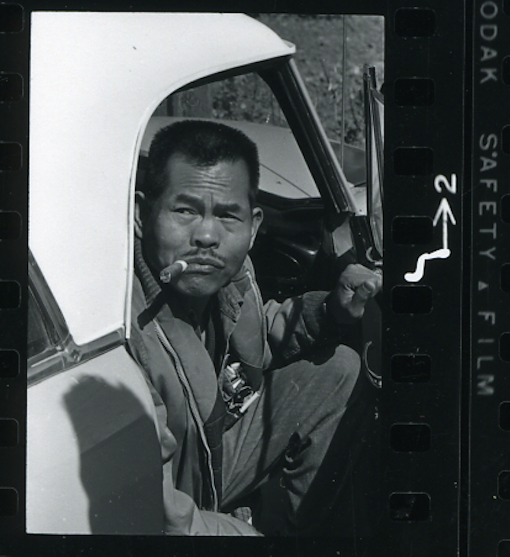Mural by Eliseo Art Silva, Photo by Eliseo Art Silva
The Hyphen Lowdown is a bi-weekly Q&A series profiling the influential and interesting, from actors, musicians, to politicians -- maybe even someone in your neighborhood! This week, Hyphen editor Nicole Wong chats with award-winning filmmaker Marissa Aroy.
At Restaurant Peony in Oakland’s Chinatown, I met up with Emmy award-winning filmmaker Marissa Aroy. Named one of the most influential Filipina women by the Filipina Women’s Network in 2010, she and her husband Niall McKay run Media Factory, a production company whose clients include PBS, the National Endowment for the Arts, Wired magazine, The Chabot Space and Science Center, CEO Women, and the Independent Film Channel. In mid-October of this year, Marissa will be traveling to the Philippines for four months to work on a short fictional piece, funded by the Fulbright Scholar Program.
Over shrimp har gow, siu mai, and rice noodle rolls, we discussed Aroy’s current projects and how she got into film.
Who are the Delano Manongs, and what made you choose them as the subject of your documentary?
My film is the story of a group of Filipino farm workers, especially Larry Itliong, who were the people who actually went on strike first in 1965 against the grape growers of Delano, CA. Not a lot of people know that Larry was the force to begin the strike and to try to meld the Filipino farm worker force and the Chicano farm worker force together. He was also co-director of the United Farm Workers with Cesar Chavez. So the film is really just to shed light on that history for Filipinos, to just know that there’s Filipino history here. I don’t think many Filipinos think about the contribution that we have made to US history, to standing up for our rights.
What was your Asian American experience growing up?
Growing up, I was trying hard to be what my friends were -- which was white. I would run around and play with my friends and then pass a mirror and think, “oh, I’m not white.” It was a separate world from my parents and doing folk dances at Filipino parties.
I think film distanced me from everything. It made me want to go into different worlds more than anything. It was escapism. I remember watching A Room with a View and wanting to be transported to Victorian England. I realized that making films could also bring me to different cultures in very real and meaningful ways.
You recently moved to New York City? Why the move, and how are you liking it?
I lived in the Bay Area for twelve years, and we needed to make a change just in terms of finding work. The idea of being a PBS documentary filmmaker has sort of passed now, and what you have in San Francisco is [that] a lot of some of the older, established filmmakers are reeling from the fact that there’s no real way to make a living from public television. It would have been the easier move to go to L.A., but I think if you’re an artist, then once in your lifetime you should try to live in New York. And if doesn’t work out, then, eh, we can always come back. And New York really does push you. You have to be confident in your art, even if it’s shitty. But that’s the case anywhere. You have to have that self-delusion or confidence to push your art.
Do you feel obligated to tell Filipino stories?
I definitely feel a responsibility of telling our story, particularly with the Delano Manongs, and telling it well, as something that can be looked at by Filipinos and hopefully enlighten them about our history here and that we should value our numbers here. We’re the second largest Asian group [in the US], but nobody knows that. There isn’t the solidarity in that sense.
There’s not a lot of Filipinos interested in documentary film in particular. There’s this sense that we don’t want to look at ourselves as Filipino because we assimilate so well into the US culture. I think it has to do with colonialism first with the Spanish and then with the Americans coming in, and not feeling like the Filipino story is worth telling somehow. Over one million Filipinos died in the Philippine-American war, but no Filipinos talk about it. It was this education or brainwashing that happened with the US that Filipinos would never criticize the US. There are a lot of Filipino artists out there, just not in documentary film. The form needs to be reinvented somehow.
What’s your dream film project?
I’d like to do a fictional film the way Justin Lin did with Better Luck Tomorrow, where it’s just a really interesting story. They just happen to be Asian American. Sometimes I feel like fictional stories touch upon the issues much more closely than you can get with documentary. We’ve seen it with Eat Drink Man Woman, and The Wedding Banquet, they’re just nice, small, well-told stories that you want to watch. That’s what I’d love to do. That, or A Room with a View … with Asians!
What is your advice to young filmmakers?
I think it’s often the stories that are right in front of us that we don’t see because we’re so close to it. But those are the best stories for us to be telling. Whether it’s documentary, and it’s just filming your own family, or fictionalizing it and having friends act in a short little piece. It’s all possible to do, even with your cell phone. If you stick close to home, you’ll find gold.
Donate online to the Delano Manongs film project! “We’re putting all donors in our credits as a thank you. Right now, we’re just waiting for more grants to be able to wrap it up, so every donation is huge.” - Marissa Aroy

Larry Itliong, Photo by George Balis










Comments